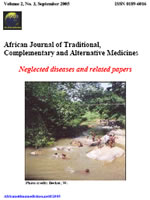
|
African Journal of Traditional, Complementary and Alternative Medicines
African Ethnomedicines Network
ISSN: 0189-6016
Vol. 14, No. 5, 2017, pp. 63-71
|
 Bioline Code: tc17059
Bioline Code: tc17059
Full paper language: English
Document type: Research Article
Document available free of charge
|
|
|
African Journal of Traditional, Complementary and Alternative Medicines, Vol. 14, No. 5, 2017, pp. 63-71
| en |
CAFFEIC ACID PHENETHYL ESTER (CAPE) MEDIATED DECREASE IN METASTASIS OF COLON CANCER CELLS: AN IN VITRO AND IN VIVO STUDY
Wu, Weiqiang; Gao, Feng; Heng, Xi; Song, Feng; Zhao, Yong; Xu, Ming; Zhang, Xin & Yang, Zengqiang
Abstract
Background: Caffeic acid phenethyl ester (CAPE) is a phytochemically active component obtained from honeybee hive
propolis. CAPE has been reported to show antimitogenic, anticancer, and other beneficial medicinal properties. Many of its
activities have been reported to be mediated by inhibiting levels of matrix metalloproteinase, that is, MMP-2 and MMP-9.
We hypothesize the effect of CAPE on the metastasis of colon cancer cells in both in vitro and in vivo.
Methods: Cell migration, motility, invasion were evaluated also expression of protein and matrix metalloproteinases
(MMPs) such as MMP-2 and MMP-9 were measured in SW-480 cancer cells in vitro. The cells were exposed to Phorbol
12-myristate 13-acetate (PMA) and were treated with various concentration of CAPE.
Results: The treatment of CAPE caused significant decrease (P<0.05) in both cell motility and invasion. The treatment of
CAPE inhibited activity of MMP-2 and MMP-9 and their protein with increasing dose in SW-480 cancerous cells. Anti-metastatic
activity was evaluated in vivo in BALB/c mice by injecting them with CT-26 mouse colon cancer cells via tail
vein and were treated with CAPE (20 mg/kg) orally for 21 days. The CAPE treatment significantly (P<0.05) reduced count
of pulmonary nodules. The mice showed decreased plasma MMP-2 and MMP-9 activity after 21 days treatment with
CAPE.
Conclusion: The study suggested beneficial role of CAPE in preventing invasion of colon cancer and metastasis via MMP-2 and MMP-9 mediated pathway.
Keywords
CAPE; colon cancer; SW-480; CT-26; anti-metastatic
|
| |
© Copyright 2017 - African Journal of Traditional, Complementary and Alternative Medicines
Alternative site location: http://journals.sfu.ca/africanem/index.php/ajtcam
|
|
